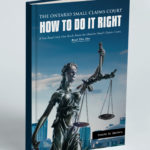
I had a case recently in which my Landlord-client found themselves in quite a pickle, to say the least.
The Landlord had a three-apartment residential complex, in which the Landlord lived in the main unit, and the other two apartments rented out to tenants. It came to pass that one of the tenants started to make noise–so much noise that the By-Law enforcement officer was called to the complex. The By-Law officer dealt with the issue but found that the apartments were, in fact, illegal apartments. The By-Law officer gave an order to the Landlord to reduce the available apartments from three down to two, or convert the entire complex back into a single family home.
To their credit, the Landlord moved quickly to bring one of the apartments into compliance with the by-law. But the other apartment had to have the stove removed. Can the Landlord do this?
It may be the case that the Landlord can’t do anything to remove the offending stove until the end of the tenancy of the illegal apartment dweller.
I know what you’re thinking: don’t you have to comply with the by-law? There was a recent case in North Bay that dealt with that very question. It only occupies a few paragraphs, yet it may have long-lasting effects in the law. In Fodor v. North Bay (City), it is a Divisional Court judicial review case. The Applicant argued this:
[59] The applicant argues that the by-law is inconsistent with the RTA because a landlord may lose his or her licence under the by-law, yet be unable to evict tenants under the RTA. It is said that this creates an impossible situation for a landlord who is, on the one hand, not authorized to rent to tenants, and on the other hand, unable to evict tenants.
The Divisional Court considered both the Residential Tenancies Act, 2006 and the Municipal Act, 2001. The Municipal Act, 2001 states this:
[56] Section 14 of the Municipal Act provides that a by-law is without effect to the extent of any conflict with,
(a) a provincial or federal Act or a regulation made under such an Act; or
(b) an instrument of a legislative nature, including an order, licence or approval, made or issued under a provincial or federal Act or regulation.
The Residential Tenancies Act, 2006 states this:
[57] The RTA also addresses statutory conflict, providing in s. 3(4) that, “[i]f a provision of this Act conflicts with a provision of another Act, other than the Human Rights Code, the provision of this Act applies.
In Fodor, it was held that the By-Law and the RTA were not in conflict with one another. That’s because the RTA and the By-Law regulate different aspects of the Landlord’s obligations. The RTA defines the relationships between the Landlord and the Tenant. The By-Law regulates the relationship between the Landlord and the City of North Bay.
So, what about my client’s predicament? When you look through what happens when a stove is removed from an illegal apartment at the Landlord and Tenant Board, a clearer picture emerges. The LTB treats the removal of the stove as a breach of the Tenant’s peaceful enjoyment of the rental unit. This usually results in an abatement of rent, sometimes as high as 20 percent, depending on the facts. You might be saying to yourself, “But I have this order from the city or township that tells me to remove the stove! I could get fined if I don’t remove it!”
If the township or city prosecutes you under the Provincial Offences Act for the contravention of the by-law, then an Order from the LTB may take precedence over the by-law, and it might give you a complete defence to the charge. Orders from the LTB are made or issued under a provincial act or regulation.
If you have an apartment that has been declared illegal by the city or town, don’t hesitate to contact me to arrange for an appointment to discuss your options.

